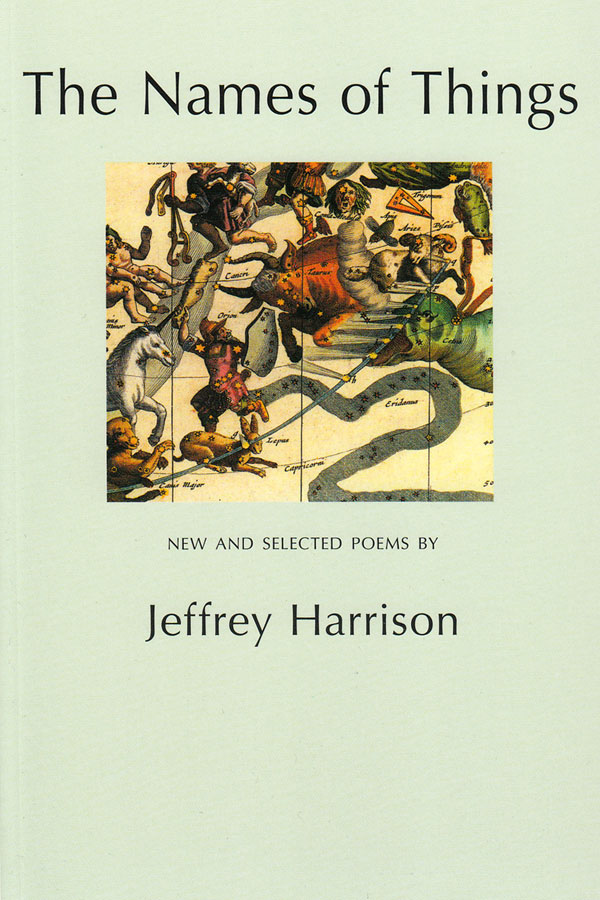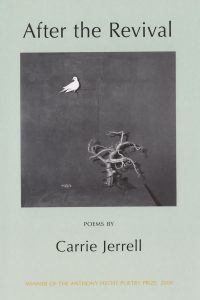The Names of Things: New and Selected Poems
£9.95
Selected from two decades of work, this volume gathers poems from Jeffrey Harrison's three books published in the United States and also includes a section of more recent poems. Since James Merrill chose his first book for the National Poetry Series in 1987, Harrison has been writing poems whose verbal precision and lyricism allow clarity and mystery to co-exist. Those early poems displayed an attentive affection for the natural world which has not diminished, but since then Harrison has increasingly explored the complexities of the human realm. Attuned to both the lyric and narrative impulses, Harrison possesses a gift for fresh description, a way with metaphors that are both understated and slyly complex, and an ability to tell a story that is at once inevitable and surprising in the turns it takes. These well-made poems range from the celebratory to the grief-stricken, chronicling our difficult, recurring passage from innocence to experience.
Out of stock
The Names of Things: New and Selected Poems
"Harrison … writes so musically that ordinary occurrences take on the tones and luster of extraordinary art." – Booklist
"Here are hauntingly composed poems of remembrance, of happiness and eagerness and regret – of life lyrically embraced, all beautifully rendered by one of our finest poets." – Robert Coles
"This is a book that can be read from start to finish with ever-heightened expectations that are never disappointed, and with sustained delight. The poems move with the fluidity of a mind’s swift and graceful agility, full of darts and surprising turns, alive with leaps, sprints, and spirals. They wind through luminous galleries of the past, antechambers of memory or the obscure outskirts of recollection, always discovering astonishments." – Anthony Hecht
"I take enormous pleasure in Jeffrey Harrison’s descriptive acuity and verbal precision, his nourishing exactitudes. Here is a poet who is always arriving, travelling far and wide to see the world anew, freshening its perceptions, deepening its memories, welcoming its mysteries." – Edward Hirsch
"There is no one else for whose poems – their tone and wording and overall approach to things – I feel greater sympathy and admiration." – James Merrill
"The poems in Jeffrey Harrison’s new collection, Feeding the Fire, chronicle our growth from the cluelessness of childhood to that slightly greater state of awareness called adult life … Harrison’s best poems … open doors to the place in the heart where we come closest to knowing who we really are." – The New York Times Book Review
"In Harrison’s work, the commonplace, the incidental, the exotic, and the miraculous all present themselves as the occasion for … unflinching meditation and the knotting of lyric intensity." – Partisan Review
"It’s thrilling to read an entire book of poems written with such pleasure and gusto. Harrison writes with remarkable confidence about a range of ordinary things – salt, rowing a boat, discarded books, a stinking pond – and he gets more out of his subjects than seems possible. How does he do this without ever being pretentious? He’s an artist." Philip Levine, Ploughshares
The Singing Underneath is a remarkable and refreshing first book of poems – as though the landscapes of Fairfield Porter, the quiet wisdom of Elizabeth Bishop, and the indomitable good humor of Guillaume Apollinaire had all found their way inside one unspoiled imagination. This is not a young poet trying ‘to find a voice,’ this is a poet who – in the rarest sense – was born with one." – Sherod Santos
"Jeffrey Harison has a rage for coherence, and each poem resolutely faces issues of landscape, family, and representation." – David Shapiro
"It is rare to encounter poetry that is suffused with a calm technical assurance and, at the same time, tense with the potential to surprise convincingly. Harrison’s language is exact, sinuous, and compelling, and leads … to places we may not have seen before, but know when we arrive. This is a beautiful book." – Henry Taylor
Reviews of The Names of Things: New and Selected Poems
Booklist, November 15th 2006
“Harrison has always been gifted at communicating the significance of his experiences and observations, both ordinary and special. In this he recalls Robert Frost, and like Frost’s, his poems expand in meaning as they are read, reread, and closely considered. Like Frost, Harrison is a traveler, but whereas Frost in his poems roams close to home, Harrison jaunts far afield as well as around the neighborhood, speculatively as well as bodily (see ‘Brief History of an Atlas’ and the two poems adverting to Arabian explorer Alexander Kinglake). His language is chaste and precise, he is formally modest, and he is as natural a poet as any writing in America." – Ray Olson
PN Review, Summer 2007
"It has taken a while for Jeffrey Harrison’s poetry to reach this country … He is a civilised, understated poet who from volume to volume has refined the characteristic American parlando to his own private purposes … [He] writes of the personal without being ostentatiously confessional, finding his subjects in items of daily life, memories of childhood and youth, or his wife and children … Jeffrey Harrison is now a poet of substance, and, in a period when it can take an effort to recall the best that America can offer, his gentle firmness and independence of spirit are worth more than whole libraries of noisier writing." – Michael Hulse
Just after breakfast and still
waking up, I take the path cut
through the meadow, my mind caught
in some rudimentary stage,
the stems of timothy bending
inward with the weight of a single
drop of condensed fog clinging
to each of their fuzzy heads
that brush wetly against my jeans.
Out on a rise, the lupines stand
like a choir singing their purples,
pinks and whites to the buttercups
spread thickly through the grasses –
and to the sparser daisies, orange
hawkweed, pink and white clover,
purple vetch, butter-and-eggs.
It’s a pleasure to name things
as long as one doesn’t get
hung up about it. A pleasure, too,
to pick up the dirt road and listen
to my sneakers soaked with dew
scrunching on the damp pinkish sand –
that must be feldspar, an element
of granite, I remember from
fifth grade. I don’t know what
this black salamander with yellow spots
is called – I want to say yellow-
spotted salamander, as if names
innocently sprang from things
themselves. Purple columbines
nod in a ditch, escapees
from someone’s garden. It isn’t
until I’m on my way back
that they remind me of the school
shootings in Colorado,
the association clinging to the spurs
of their delicate, complex blooms.
And I remember the hawk
in hawkweed, and that it’s also
called devil’s paintbrush, and how
lupines are named after wolves. . .
how like second thoughts the darker
world encroaches even on these
fields protected as a sanctuary,
something ulterior always
creeping in like seeds carried
in the excrement of these buoyant
goldfinches, whose yellow bodies
are as bright as joy itself,
but whose species name in Latin
means “sorrowful.”
The Waywiser Press
Gift
for James Merrill, in memory
This helix of wheat
has hung by a thread
from the windowframe
for years now,
almost weightless,
spinning sometimes
when a breeze
comes through the screen.
A token of fertility,
you brought it back
from the Peloponnese
and passed it on to me
because, seeing it
among the oddments
on your mantelpiece,
I marveled at
its ingenuity –
also, I think, because
it answered my wish
for a child. The sun,
some mornings, plays
on your gift, turning it
into a spiral cage
of light; other times
it hangs in shadow
and takes on the weight
of your death –
and yet the thread
still holds. These months
I’ve felt the pull
of this wheatstalk whorl
again and again
and, thinking of you,
looked up to see it
suspended there
between two worlds,
in the changing light.
The Waywiser Press
Excerpts
The Names of Things
Just after breakfast and still
waking up, I take the path cut
through the meadow, my mind caught
in some rudimentary stage,
the stems of timothy bending
inward with the weight of a single
drop of condensed fog clinging
to each of their fuzzy heads
that brush wetly against my jeans.
Out on a rise, the lupines stand
like a choir singing their purples,
pinks and whites to the buttercups
spread thickly through the grasses –
and to the sparser daisies, orange
hawkweed, pink and white clover,
purple vetch, butter-and-eggs.
It’s a pleasure to name things
as long as one doesn’t get
hung up about it. A pleasure, too,
to pick up the dirt road and listen
to my sneakers soaked with dew
scrunching on the damp pinkish sand –
that must be feldspar, an element
of granite, I remember from
fifth grade. I don’t know what
this black salamander with yellow spots
is called – I want to say yellow-
spotted salamander, as if names
innocently sprang from things
themselves. Purple columbines
nod in a ditch, escapees
from someone’s garden. It isn’t
until I’m on my way back
that they remind me of the school
shootings in Colorado,
the association clinging to the spurs
of their delicate, complex blooms.
And I remember the hawk
in hawkweed, and that it’s also
called devil’s paintbrush, and how
lupines are named after wolves. . .
how like second thoughts the darker
world encroaches even on these
fields protected as a sanctuary,
something ulterior always
creeping in like seeds carried
in the excrement of these buoyant
goldfinches, whose yellow bodies
are as bright as joy itself,
but whose species name in Latin
means “sorrowful.”
The Waywiser Press
Gift
for James Merrill, in memory
This helix of wheat
has hung by a thread
from the windowframe
for years now,
almost weightless,
spinning sometimes
when a breeze
comes through the screen.
A token of fertility,
you brought it back
from the Peloponnese
and passed it on to me
because, seeing it
among the oddments
on your mantelpiece,
I marveled at
its ingenuity –
also, I think, because
it answered my wish
for a child. The sun,
some mornings, plays
on your gift, turning it
into a spiral cage
of light; other times
it hangs in shadow
and takes on the weight
of your death –
and yet the thread
still holds. These months
I’ve felt the pull
of this wheatstalk whorl
again and again
and, thinking of you,
looked up to see it
suspended there
between two worlds,
in the changing light.
The Waywiser Press





